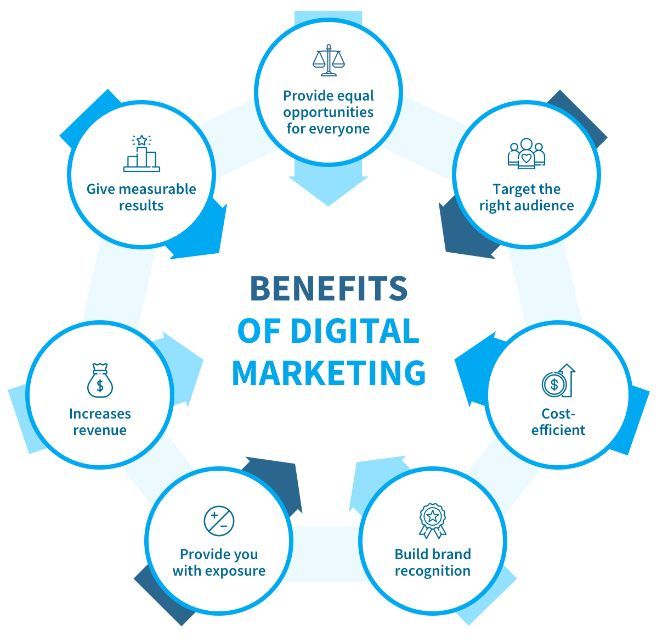Starting out
In today’s world, which is very connected, digital marketing is not just an option; it is a must. The digital world is a huge chance and a huge stress for small businesses. The online world can be hard to navigate, but if you plan ahead, it can help small businesses compete with big companies on a more level playing field. This article looks at how digital marketing helps small business grow by helping them scale, connect, and do well in a world that is becoming more digital.
What is digital marketing and why is it important today?
The phrase “digital marketing” refers to a wide range of online tactics and platforms used to advertise products and services. Websites, social media, search engines, and email campaigns are just a few of the many tools that are part of digital marketing and can help you increase brand recognition, attract clients, and generate revenue.
In a world where consumers’ attention is dispersed and mobile-first behavior is the norm, digital marketing enables businesses to reach people in real time. Due to its speed, versatility, and global applicability, it is a crucial tool for businesses today.
The Unique Challenges Small Businesses Face in a Digital World
Small businesses frequently face severe financial limitations, a shortage of employees, and inadequate technology infrastructure. It’s difficult to compete with big businesses that have devoted digital teams and enormous advertising budgets.
Furthermore, many small businesses lack the internal agility and insight needed to navigate constantly changing algorithms, search engine optimization (SEO) guidelines, and consumer behavior trends. Without a well-defined plan, the digital divide can seem overwhelming.
How digital marketing makes things fairer
Even with these problems, digital marketing gives everyone a fair chance to compete. Small businesses can do much better than they should with creativity, honesty, and data-driven methods. For example, social media sites reward engagement and originality over budget, which lets local brands go viral. Search engines work in the same way. They give higher rankings to small websites with well-optimized content that is relevant and useful.
Small businesses can use digital tools that are easy to use to build authority, get people to know their brand, and reach their target audiences quickly and cheaply.

The Key Benefits of Digital Marketing for Small Businesses
Cost-Effective Strategies That Deliver Big Results
The return on investment from digital marketing is remarkable. Many digital channels, like content marketing and organic social media, require little financial investment, in contrast to traditional advertising, which frequently entails large upfront costs. It is cost-effective and results-driven because small businesses can begin small, test strategies, and scale according to performance.
Targeted Marketing That Reaches the Right Audience
Digital marketing enables laser-targeted campaigns as opposed to broad, aimless ones. Small businesses can determine their ideal client profiles and create content that appeals to them by using data analytics and audience segmentation. Businesses can reach users based on their demographics, behavior, interests, and intent thanks to platforms like Facebook and Google Ads, which provide precise targeting options.
Measurable Outcomes to Monitor Every Money Spent
The measurability of digital marketing is one of its biggest advantages. Businesses can monitor conversions, bounce rates, and engagement in real time with tools like Google Analytics, Facebook Insights, and email performance metrics. By removing uncertainty, this transparency promotes better budget allocation, ongoing optimization, and more intelligent decision-making.
Increasing Client Loyalty and Engagement
Two-way communication is encouraged by digital marketing. Businesses can establish connections with their audience through personalized campaigns, email newsletters, and social media interactions. Repeat business and brand advocacy are more likely to come from engaged consumers. Trust and a feeling of community are fostered by consistent digital touchpoints.
Important Digital Marketing Channels for Small Businesses
The Significance of a Website for All Small Businesses
The digital storefront is a well-designed website. It frequently serves as a prospective customer’s initial point of contact. An SEO-optimized, mobile-friendly, and well-designed website builds trust, offers important information, and encourages conversions. It serves as the cornerstone of any successful digital marketing plan.
The Power of Social Media for Local Engagement
Customers can be reached directly through social media platforms. They enable companies to conduct promotions, disseminate updates, and develop their brand identities. Platforms such as Facebook, Instagram, and TikTok provide geo-targeting capabilities and community-building opportunities for local businesses, converting followers into devoted fans.
Email Marketing: Establish and Maintain Connections with Customers
One of the digital channels with the highest conversion rates is still email. Businesses can send targeted messages that motivate action by using segmentation and personalization. Email keeps your brand at the forefront of consumers’ minds, whether it’s through a welcome series, reminders for abandoned carts, or seasonal promotions.
Search Engine Optimization to Get Found Online
SEO makes sure your company shows up when customers look for goods or services similar to yours. Small businesses can increase their organic visibility and draw in high-intent visitors by using technical optimization, keyword research, and high-quality content.
Instant Visibility through Pay-Per-Click Advertising
PPC advertising gives you exposure right away. Businesses can bid on keywords and show up at the top of search results using platforms like Google Ads. Even small budgets can generate a lot of traffic and leads with the right approach.
Using Content Marketing to Establish Authority and Trust
Publishing educational videos, guides, and blogs establishes a company as an authority in its field. In addition to increasing organic traffic, content marketing fosters the buyer journey, educates prospective clients, and increases trust.
Real-World Examples of Digital Marketing Success
How Local Shops Grew Revenue Using Facebook Ads
A small boutique in Austin used hyper-local Facebook ads to promote in-store events and flash sales. With compelling visuals and geo-targeted promotions, they saw a 200% increase in foot traffic over two months.
Case Study: SEO Helped a Small Bakery Triple Its Traffic
A neighborhood bakery optimized its website content with location-based keywords and created a blog featuring baking tips. Within six months, organic traffic tripled and online orders surged.
Email Campaign That Turned First-Time Buyers Into Loyal Fans
An artisanal soap brand launched a welcome email series offering skincare tips and discounts. The campaign achieved a 45% open rate and boosted repeat purchases by 30% within the first quarter.
How to Build a Winning Digital Marketing Strategy
Define Your Business Goals and Target Audience
Start with clarity. What do you want to achieve—brand awareness, lead generation, or sales? Who are your ideal customers? Defining these helps shape every aspect of your strategy, from messaging to channel selection.
Choose the Right Digital Marketing Channels
Not every platform suits every business. A B2B service might thrive on LinkedIn, while a fashion boutique finds its audience on Instagram. Focus on the platforms your audience uses most and align your content accordingly.
Create a Budget That Maximizes ROI
Determine what you can invest and allocate it strategically. Balance between paid and organic efforts, and always leave room for testing and scaling what works best.
Monitor, Analyze, and Adjust for Continuous Growth
Digital marketing is dynamic. Regularly review analytics, tweak campaigns, and test new approaches. This iterative process ensures you stay relevant, efficient, and growth-oriented.
Common Digital Marketing Mistakes to Avoid
Ignoring Mobile Optimization
With most users browsing on smartphones, a website that isn’t mobile-optimized frustrates visitors and loses leads. Ensure your digital assets load quickly and display flawlessly on all devices.
Focusing on Quantity Over Quality
Pumping out content without purpose dilutes brand value. Prioritize high-quality, valuable content that serves your audience’s needs and positions your business as a trusted resource.
Neglecting Data and Analytics
Flying blind is a recipe for wasted resources. Use data to inform decisions, track performance, and refine strategies. Insight is the compass that guides successful digital marketing.
Inconsistent Brand Messaging Across Channels
Disjointed messaging confuses potential customers. Maintain a consistent voice, tone, and branding across all platforms to build recognition and trust.
Conclusion
Why Small Businesses Can’t Afford to Ignore Digital Marketing
In an era where online presence dictates visibility and trust, digital marketing is no longer optional for small businesses. It offers scalability, precision, and cost-efficiency—empowering even the smallest players to make a lasting impact.
Simple Next Steps to Start Your Digital Marketing Journey
Begin with a clear goal, identify your audience, and select one or two channels to start. Create valuable content, measure everything, and refine your strategy over time. The digital world rewards action—take that first step and start building your online momentum today.

